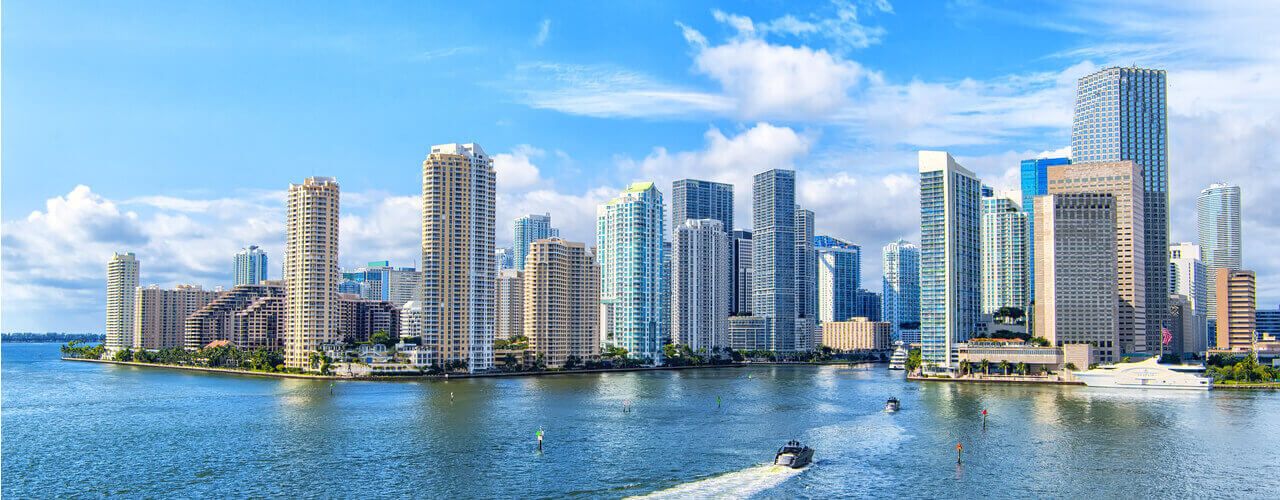For our latest interview in the Expert Insights series, we had the pleasure of speaking with Fernando Arencibia Jr, P.A., Broker-CEO at Arenci Properties Realty, a full-service real estate brokerage specializing in Commercial and Residential real estate in South Florida. Although he didn’t start his career as a realtor, Mr. Arencibia feels that this profession fits him like a glove and has been a commercial real estate broker for over 15 years. He previously worked at RE/MAX for a decade, then he decided to open Arenci Properties Realty.
Mr. Arencibia is currently the 2020 MIAMI Realtors Commercial President. He values collaboration and relationships and believes in continually refining his craft and industry knowledge. Here’s what he has to say about the challenges of the commercial market during these challenging times, what we might expect from the future of CRE after the pandemic and more.
Q: Could you start by telling us a little bit about your background and why you chose a career in commercial real estate?
This is a second career for me. I was a history, government, and economics teacher for the better part of a decade when I started investing in single-family homes in South Florida. Quickly I learned that financial leverage was the key to help me achieve my investment goals. Not wanting to be in the dark about the mortgage loan approval process, I became a licensed mortgage broker and that was my introduction to the real estate industry as I began to help others secure financing for themselves. Becoming a Realtor felt like a natural progression for me. For the first couple of years, I focused on residential real estate, until I met an investor looking to achieve economies of scale by acquiring multifamily buildings. The acquisition process on that first commercial transaction focused squarely on the numbers and the financial viability of the investment; all aesthetic or personal preference considerations where put aside. I was totally hooked, and I’ve been primarily a commercial real estate broker for the better part of 17 years. After 10 years at REMAX, I opened ARENCI PROPERTIES REALTY in February of 2019, we specialize in commercial and investment residential sales in the urban core of Miami.
Q: Considering the current COVID-19 pandemic, what are your thoughts on the CRE market in the US today in terms of trends and challenges?
Every industry and sector in America have been forced to pivot and adjust to this “Black Swan” event that hopefully we won’t see for another 100 years. In the near term, the commercial real estate properties with owner occupied businesses or tenants that are most affected by the economic shutdown are seeing an impact to their fundamentals. Not every asset class will be affected the same, however, and a good rule of thumb is to look at the period of guaranteed tenancy that is customary for each asset class. Hotels, entertainment venues, and parking lots, for example, rent by night or by the hour and are most affected, followed by Multifamily, Retail, Office and lastly Industrial, which may be the least affected of all. Landlords have mobilized to address their tenants’ request for rent relief while looking to their lenders for mortgage forbearance themselves. They’re finding that the local community banks have been most receptive and helpful while those that are carrying CMBS debt have been unable to find any relief.
On the transactional side of the coin, we have not seen significant price reductions, instead we have seen listings getting pulled off the market out of safety concerns or because owners have been unwilling to negotiate during this time of uncertainty. However, many pending properties have dealt with contract cancellations only to receive new contract offers shortly after re-entering the market. In essence, those who have stayed the course have seen an uptick in interest in their properties and are the beneficiaries of a temporary lack of inventory. Moving forward everyone in the CRE ecosystem will have to adjust to the challenges posed by the current COVID-19 pandemic, particularly related to how we curate our retail, office and industrial spaces to allow for the responsible reopening of our economy.
Q: What differentiates the commercial real estate market in Florida from other major markets in the United States?
We are a global city; we garner attention not only as the gateway to the Americas but across the pond and all around the world. Miami offers less expensive properties than most other major metropolitan areas in the U.S. and the world – and will continue to attract buyers, investors and businesses from the U.S. and worldwide. South Florida, while having a strong tourism industry, also has a diversified economy, offering no state income tax and one of the best environments to start a business. Our market is strong and resilient and will continue to attract business entities and buyers from other states and countries.
Q: How have you seen the industry evolve in the past years?
We’ve seen an evolution in almost every aspect of our industry. Retail has had to contend with changing consumer habits and the growth of e-commerce, which had led to the advent of “experiential retail”. Technological advancements in logistics have altered the height and dimensions of newly developed industrial spaces. The office sector has faced the advent of the Coworking trend of shared desks and common areas. Multifamily has seen a tenancy base that’s become more interested in living close to the urban core where there is more walkability and less reliance on the use of a car. Consumers and investors have become more data driven in their decision making and have more access to that data.
Q: Where do you see it going in the future?
Most every trend in CRE will be accelerated by the current Coronavirus pandemic, but new trends will also emerge. Social distancing guidelines will only add more fuel to the e-commerce revolution. Retail landlords will have to adjust in the short-term for sure, but the expectation is that there will be long-term changes to what has been a growing trend of “experiential retail”. The expectation is that we will also see increased interest in what is referred to as “last-mile” industrial facilities in the supply chain, as well as having multiple somewhat smaller distribution centers to counteract the potential closure of any one facility due to a similar health crisis. All of the meetings being conducted through virtual platforms in the past few weeks have given employers the sense that telecommuting is a viable option. And many have been surprised by the productivity of their employees who are working from home. As we re-evaluate the office design, great emphasis will be placed in reducing the density of the workspace along with increasing air quality and creating a healthy work environment. No doubt touchless technologies will have a big impact on the latter. We may see investors and end-users alike finding more value in suburban commercial real estate because of the proximity to their domiciles and the customers they service. The “adaptive re-use” of commercial properties will be an important trend as investors find creative reconfigurations of economic obsolescent spaces.
Q: Are there any lessons from the past few years that you would impart as an absolute must for those looking to get into the CRE industry?
Research and analytics are the name of the game and data is king. This is not an industry for hobbyists; it requires specialization and constant education and training. Those who focus on the intricate dynamics of each asset class are better equipped to increase the value of their investment portfolio and are better suited to serve their clients. Now more than ever a practitioner’s skills set and knowhow will make a significant difference. Don’t be shy to ask questions. A sense of curiosity and earnest desire to learn can be your greatest attribute when embarking on a career in CRE. Also be sure to partner with experienced professionals; it will help you get the job done right and will accelerate your learning curve.
Q: What is your general assessment for the commercial real estate market in 2020? Have you spotted some interesting market trends, especially considering the current pandemic?
Difficult to say short-term, but long-term there will be huge potential for growth and significant pent-up demand. Real estate market fundamentals have been very strong and very different than what they were going into the last recession (no subprime mortgage issue, very low delinquencies, strong demand/low supply, low interest rates, strong population growth and demand from foreign buyers). We are not in a market that is saturated by too much supply. In fact, the argument can be made that we continue to have a lack of inventory, which is why it doesn’t surprise me that CRE properties that have been properly introduced to the market are garnering a lot of attention, especially over the past two weeks. I’m optimistic to see what happens from August on and into Q4, I think this market may surprise us all.
Q: How has the evolution of online marketing impacted the commercial real estate industry?
It’s been tremendously important because it has allowed our industry to extend our reach nationally and internationally. Our ability to convey the value of an asset by utilizing the different online marketing platforms allows us to give each investment vehicle maximum exposure to the marketplace. Those who have embraced high-quality photography, 3D Virtual Tours, Videos, etc., have seen an increase in competitive offers and have shortened their time on the market.
Interested in being interviewed for our Expert Insights series? Feel free to reach out to us at [email protected] or check out other articles from our series here.










